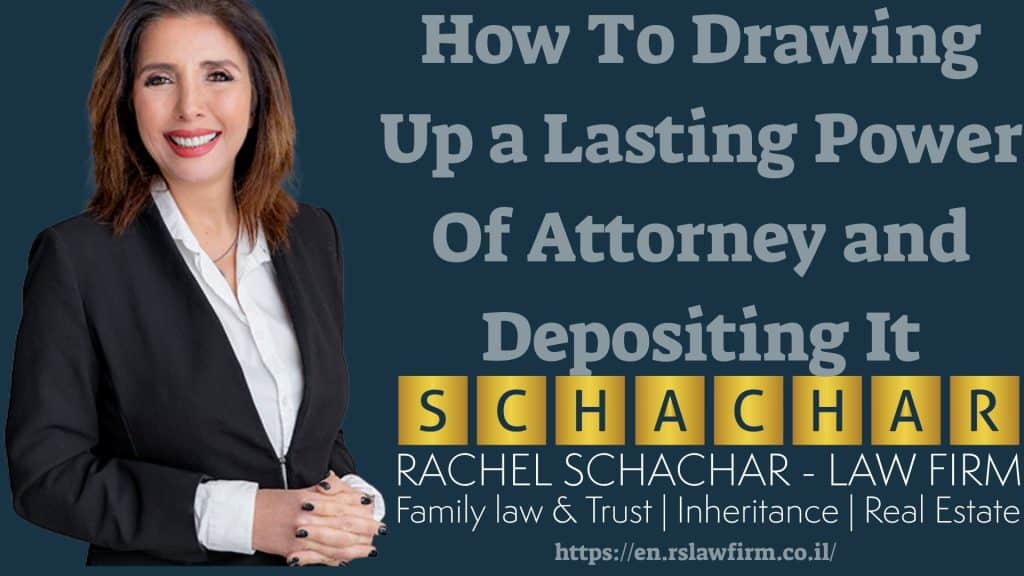A durable power of attorney allows a person over the age of 18 to appoint a proxy who can make decisions for him in the future, if he can no longer do so himself
The lasting power of attorney may only be drawn up by a lawyer who has undergone special training, and who has no personal interest in the power of attorney
A durable power of attorney can regulate all or part of personal, financial or medical issues. Regulation of medical issues only, will be done with a power of attorney for medical treatment
A person over the age of 18 may appoint a proxy, who will be able to make decisions for him in the future if he can no longer do so himself.

- As part of the power of attorney, that person can determine in advance instructions for the power of attorney on how to behave and what decisions to make, and he can also leave the power of attorney full discretion in making decisions.
- The power of attorney will only be valid if it is drawn up in accordance with what is detailed on this page.
- The same power of attorney can be appointed for all the desired matters, but it is also possible to appoint several power of attorneys. It is possible to decide on the appointment of a replacement proxy in case the first proxy is unwilling or unable to act. It is possible and appropriate to determine whether the representatives of the power will act jointly or separately, what is the extent of the powers and responsibilities of each of them, as well as who will decide in the event of a dispute between them.
- The power of attorney must agree to his appointment by the power of attorney and he cannot be forced to act as a power of attorney.
| Requirement | Details |
| Age Limit | Over 18 years old |
| Comprehension | Understands the EPA’s significance and goals |
| Legal Advisor | Specialized lawyer required, no personal interest |
| Scope of EPA | Personal, Financial, or Medical (Medical needs have separate documents) |
| Multiple Appointments | Multiple attorneys possible, with replacements |
| Joint/Separate Decision-Making | Can decide joint or separate decision-making |
| Consent of Attorney-in-Fact | Attorney-in-fact must agree, cannot be forced |
Target population and prerequisites
- Any person who wishes to determine in advance who will make decisions on his behalf in the future or which decisions will be made on his behalf in the future when he cannot make them himself.
- The person must meet the following two conditions:
- He is over 18 years old.
- He understands the meaning of the continuing power of attorney, its goals and results (if it is a person with a disability, the meaning is that he is able to understand this given the necessary adjustments to his situation).
The steps of the procedure
- The continuing power of attorney may only be drawn up by a lawyer who has undergone special training and has been authorized to do so by the general guardian, and who has no personal interest in the power of attorney.
- The appointing person may include preliminary instructions in the power of attorney.
- The appointing person confirms to the lawyer who prepares the power of attorney that he understands the meaning of granting the power of attorney, its goals and results, and that the power of attorney was given with free and voluntary consent, without unfair pressure or influence being exerted on him and without taking advantage of his distress or weakness.
- The lawyer who executes the power of attorney will bring to the attention of the appointing person, among other things, the legal meanings of the power of attorney, the alternatives that exist for it, and the matters that can be included in the continuing power of attorney.
- The submission of the power of attorney will be done by the lawyer who drafted it online. Only lawyers authorized to do so have access to the online system.

pay attention
If it is a power of attorney for medical issues only, it can be drawn up in front of any lawyer (even those who have not undergone special training in the matter), as well as in front of a licensed doctor, social worker, psychologist or qualified nurse.
Required documents
- In addition to the power of attorney form, you can add the following documents:
- An expert opinion, if it was required by the lawyer who drew up the document, as evidence to prove the competence of the appointer to draw up a lasting power of attorney.
- Appendix preliminary instructions, if there is not enough space for instructions in the form itself. The appendix should be scanned next to the continuing power of attorney form.
- Confidentiality Waiver Form of the Delegate of Power.
- Medical certificate.
- Photocopy of the identity card of the appointer and/or power of attorney.
- Any other document that the appointee wants to attach.
- Please note: If the appointor chose the option of authorizing the power of attorney to agree to psychiatric hospitalization of the appointor despite the appointor’s behavior, it is mandatory to attach Appendix A to a form signed by a psychiatrist, and scan into the continuing power of attorney form as one file.
| Steps | Details |
| Qualified Lawyer | Only specialized lawyers with training |
| Preliminary Instructions | Appointing person can include instructions |
| Consent and Understanding | Person confirms understanding and consent |
| Legal Guidance | Lawyer explains legal aspects and alternatives |
| Online Submission | Lawyer submits the EPA online |
| Special Consideration | Medical EPAs can be drawn up by non-specialized professionals |
Power of attorney deposit

- After drawing up a lasting power of attorney, it must be deposited with the general guardian as a prerequisite for its entry into force.
- The power of attorney can be entrusted in two ways:
- Deposit with a lawyer: sending an online original copy of the power of attorney through the computerized system of the general guardian. The document must be electronically signed by the lawyer before whom the document was drawn up and signed.
- Deposit by the appointee (only after the document has been deposited by the lawyer) in one of the following ways:
- Entry into the government identification system and approval of the document submitted by the lawyer in the computerized system of the general guardian. For an explanation of the deposit using the government identification system, click here.
- Audience reception – the appointer can deposit the document in the district that handles the case (according to his place of residence) on Mondays and Wednesdays, between 12:30-08:30, by prior appointment only.
- In any case, the lawyer must keep the original paper document of the continuing power of attorney for a period of 7 years from the date of entry into force or from the date of expiration or cancellation of the document, whichever is earlier.
- An expert’s opinion can be attached, if it was required by the lawyer who drew up the lasting power of attorney, as evidence to prove the competence of the appointing person.
- You can attach any relevant document that the appointing person wants to attach to the lasting power of attorney (eg a detailed list of assets).
- If several continuing powers of attorney have been deposited in the same matters, the last power of attorney in the same matter is decisive.
The approval of the general guardian
- After receiving the original copy from the general guardian and at the end of processing the application, a notification will be sent to the appointing person with a copy to the lawyer about the approval or rejection of the deposit request, or a request to complete documents.
- When deposited by the appointer, the processing of the request will be up to 21 days.
- From the date of the deposit of the continuing power of attorney until the date of its entry into force, the general guardian will send the appointing person a reminder, once every 3 years, to make sure that the person does not want to change the power of attorney for any reason.
| Deposit Methods | Details |
| Lawyer Deposit | Online submission through a lawyer |
| Lawyer’s Signature | Document must be electronically signed by the lawyer |
| Appointee Deposit | Possible after lawyer’s deposit |
| Government Identification System | Entry and approval through government system |
| Audience Reception | In-person deposit at the district office (by appointment) |
Matters that should or can be included in the Enduring Power of Attorney
- In the power of attorney, the person will specify in which matter the power of attorney is authorized to act on his behalf (property matters, personal matters excluding medical matters, and medical matters).
- In addition, the person can include preliminary instructions for when the power of attorney will come into effect and regarding its expiration.
- A person may determine in the power of attorney instructions regarding the expiration of the power of attorney, including its expiration date, even if it has not been activated yet.

example
A person can order that the continuing power of attorney is for a period of 5 years after which it is no longer valid.
- The appointing person may specify in the continuing power of attorney one or more persons (referred to as an “informed person”), to whom the power of attorney must report decisions or actions on the issues listed in the power of attorney, and he may determine that the power of attorney will report his actions to the general guardian.
- A person who is a relative of the proxy cannot be chosen for such a report, unless the proxy is a relative of the appointing person.
- An “informed person” may demand from the power of attorney information about decisions he made and actions he took on the issues listed in the power of attorney.
- There are actions that must be explicitly included in the continuing power of attorney, there are actions that, even if mentioned, will require court approval in order to exercise them, and there are actions that, even if mentioned in the power of attorney, cannot be exercised. For more information, see about limitations on the powers of a proxy in a continuing power of attorney.
Matters Included in Enduring Power of Attorney
| Matters | Details |
| Authorized Matters | Specify property, personal (excluding medical), and medical matters |
| Preliminary Instructions | Set instructions for EPA activation and expiration |
| Duration of EPA | Determine an expiration date or event |
| Informed Persons | Specify individuals to whom the EPA reports |
| Restrictions on Reporting | Relatives cannot be chosen unless they are also relatives of the appointing person |
pay attention
For power of attorney for medical needs only, see Power of Attorney for medical treatment.
Limitations on the actions of the power of attorney
- The law limits the manner of operation of the power of attorney, as follows:
- There are actions that require an explicit mention in the power of attorney, otherwise they cannot be performed at all.
- There are actions that cannot be included and will not be given effect even if they are mentioned, so the power of attorney is completely prevented from performing them.
- There are actions that can be included, but court approval will be required for their implementation, and without it the power of attorney has no authority to act in these matters.

Receiving information about depositing a lasting power of attorney
- The Attorney General as well as a social worker are entitled to receive information about the deposit of a lasting power of attorney and a copy of it.
- From the date of entry into force of a continuing power of attorney, the person’s relatives and the “informed person” are entitled to receive information about the deposit of the power of attorney, the identity of the power of attorney and the “informed person” and the types of matters for which the power of attorney was given – unless the person limited the continuing power of attorney their entitlement.
- Entry into force of a lasting power of attorney
- A continuing power of attorney will come into effect at the time when the appointing person is no longer able to understand the subject for which the power of attorney was given.
- With regard to a continuing power of attorney for property matters, it is possible to establish entry into force under other conditions as well, when the appointor is still able to understand the matter.
| Limitations | Details |
| Explicit Mention Required | Certain actions must be explicitly mentioned |
| Actions Not Permitted | Some actions are prohibited, regardless of mention |
| Court Approval Required | Certain actions need court approval to be performed |
Service and support
- The General Guardian Division at the Ministry of Justice operates a service and support center in the field of continuing power of attorney:
- By phone 08-6831664 on Sunday-Thursday from 8:00 a.m. to 4:00 p.m.
- By e-mail ycm@justice.gov.il – answering questions about continuing power of attorney.
- By fax 073-3926975.
- You can use the Frequently Asked Questions and Answers page on the Enduring Power of Attorney on the General Guardian’s website.

Important Information
- In order for the continuing power of attorney to take effect, there is no obligation for the person to lose his legal capacity.
- However, it can be determined that the continuing power of attorney will take effect in this situation, and then the power of attorney’s entry into office can be done instead of appointing a guardian in the specific matters defined in the continuing power of attorney.
| What is an Enduring Power of Attorney (EPA)? | Answer: An Enduring Power of Attorney (EPA) is a legal document that allows a person over the age of 18 to appoint a proxy who can make decisions on their behalf in the future, should they become incapable of making those decisions themselves. |
| Who can create an Enduring Power of Attorney (EPA)? | Answer: Any person over the age of 18 who understands the significance of an EPA and its implications can create one, provided they meet the comprehension criteria. |
| What areas can be covered by an EPA? | Answer: An EPA can regulate personal, financial, or medical matters. There’s also a specific document, the “Power of Attorney for Medical Treatment,” for medical matters alone. |
| Can multiple attorneys-in-fact be appointed in an EPA? | Answer: Yes, it’s possible to appoint multiple attorneys-in-fact for various matters. Additionally, you can appoint alternate attorneys-in-fact in case the primary one is unwilling or unable to act. |
| What are the conditions for an EPA to enter into force? | Answer: An EPA enters into force when the appointing person is no longer capable of understanding the matters for which the EPA was created. For property matters, it can enter into force under other conditions while the appointor is still capable of understanding. |
| What limitations exist on the actions of the attorney-in-fact? | Answer: There are actions that must be explicitly mentioned in the EPA to be performed, actions that can’t be included, and actions that require court approval for implementation. |
| How can I deposit my Enduring Power of Attorney (EPA)? | Answer: To deposit your EPA, it must be drawn up by a lawyer who has undergone special training and has been authorized to do so by the general guardian. It can be deposited online through a lawyer or by the appointee after it has been deposited by the lawyer, either through government identification systems or by visiting the district handling the case. The lawyer must retain the original document for seven years. |
Experience and Expertise in Durable Power of Attorney: Choose Rachel Schachar Law & Notary Firm
At Rachel Schachar Law & Notary Firm, we understand the critical importance of planning for your future when it comes to matters of durable power of attorney. With years of dedicated experience in family law and a specialization in the intricacies of durable power of attorney, our firm stands ready to assist you in crafting a comprehensive and tailored plan. We believe that everyone deserves peace of mind, knowing that their affairs will be handled according to their wishes when they are no longer able to make decisions themselves. Our team of knowledgeable attorneys is committed to guiding you through the process, whether you require assistance in personal or property matters, and whether you seek specific instructions or prefer to grant your appointed attorney independent discretion. When it comes to securing your future, trust Rachel Schachar Law & Notary Firm to provide the expert legal counsel and support you need.





